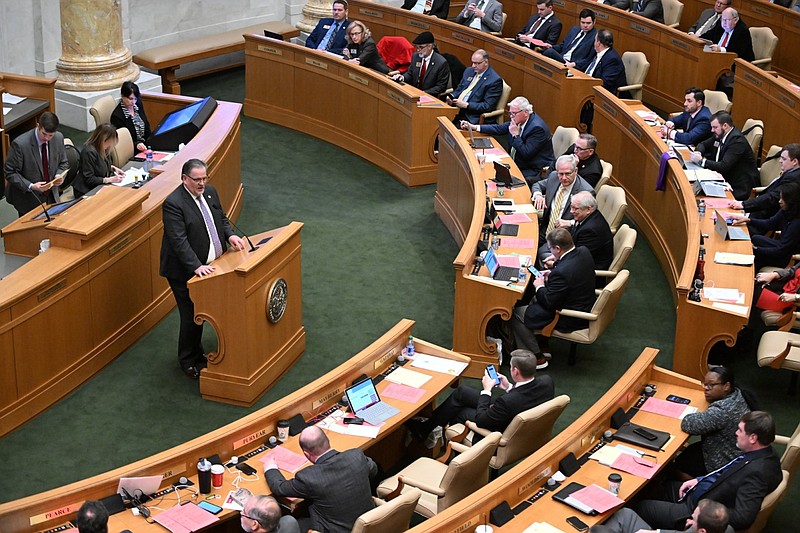A public school funding bill filed late Thursday calls for a per student increase for the 2023-2024 and 2024-2025 academic years.
But it is less than what lawmakers recommended in the fall.
Overall, funding for public schools in House Bill 1688 -- the legislation filed late Thursday and sponsored by Rep. Brian Evans of Cabot and Sen. Jane English of North Little Rock, both Republicans -- would increase by about 2.8%. Precise figures were not available late Thursday and were not included in the version of the six-page bill.
The legislation calls for an increase in the per-student foundation funding by $205 to $7,618 for the 2023-2024 school year. For the 2024-2025 school year, the legislation calls for the per-student funding to increase to $7,771. The per-pupil funding for the 2022-2023 school year is $7,413.
The funding bill filed Thursday is part of a mandated process that lawmakers review education adequacy and determine how much the state will spend on public schools for the next two-years. The per-student foundation funding is the largest part of state funding for public education. Schools also receive supplemental state and federal funds for education.
The per-pupil funding in the bill is less than the $8,129 the House and the $8,150 Senate committees recommended in November for the total foundation funding rate for the 2023-2024 school year.
He also said the per-student funding was less than what lawmakers initially proposed because of a lack of need to increase insurance for full-time staff. The bill calls for the school districts to pay a health insurance contribution rate set by the General Assembly.
[DOCUMENT: Read the bill on public school funding » arkansasonline.com/324hb1688/]
"I think it falls in line with kind of a track record of what this General Assembly has done over the last eight to 10 years," Evans said.
The education adequacy review process began in the wake of the 2003 Arkansas Supreme Court's decision in Lakeview School District v. Huckabee which ruled the state's funding for education was inadequate and unconstitutional.
The process is separate from the LEARNS Act, which increases the minimum salary for teachers to $50,000 a year and creates a voucher program for students to attend a private school or funds home school costs. The LEARNS Act also calls for $2,000 raises for teachers already making more than the $50,000 a year salary. Teacher raises, through the LEARNS Act, are funded separately.
REACTION
"I'm concerned to see that the increase looks to be far less than what the House recommended," Rep. Denise Garner, D-Fayetteville, said in a statement, referring to per pupil funding.
In the bill filed Thursday, full-time classified staff, bus drivers, custodians and other school workers would receive funding for about a $2 per hour raise, Evans said. In addition, the state will fund a 1.8% cost of living adjustment for teachers and school secretaries in fiscal year 2024 and a 2.2% increase in fiscal year 2025 according to Evans.
"The proposed legislation by Representative Evans and Senator English is a good start," said Carol Fleming, president of the Arkansas Education Association, the state's largest organization representing teachers and support staff. "I would be remiss if I did not note that there are other issues of concern with the funding proposals. That includes funding for health insurance and the average salary for educators."
MORE DETAILS
Enhanced Student Achievement Funding, for school districts with a high percent of students in a free and reduced lunch program, would remain flat.
School districts with 90% or more of students in a national school lunch program would still receive an additional $1,613 in per-pupil funding for the 2023-2024 and 2024-2025 school years. School districts with 70% or more students in a national school lunch program would still receive $1,076 per student for the next two school years. School districts with less than 70% of students in a national student lunch program would receive $538 per-student for the next two school years, the bill proposes.
Evans said that is because the LEARNS Act calls for funding for struggling students, citing the law's provision for literacy coaches and grants for tutors for students reading at below grade level.
Categorical funding for alternative learning environments will increase by $193 per-pupil to $4,987 for the 2023-2024 school year and $5,086 for the 2024-2025 school year. For English language learners, the bill calls for $366 per-student for the 2023-2024 and 2024-2025 school years, a $7 increase.
Information for this article was contributed by Will Langhorne of the Arkansas Democrat-Gazette.

